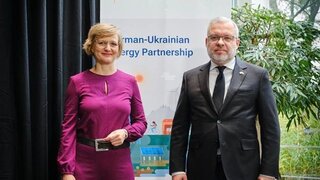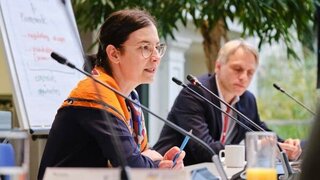3rd German-Ukrainian Energy Day

On the 25th of October 2023, the third German-Ukrainian Energy Day took place in Berlin. This high-level event for decision-makers from governmental institutions, the private sector, civil society, and international organisations is an integral part of the German-Ukrainian Energy Partnership. The participants were set to discuss the emergency support achievements of the German-Ukrainian energy partnership as well as the relevant and strategic priorities for both countries in order to accelerate a long-term recovery and energy transition. The Minister of Energy of Ukraine, German Galushchenko, Dr Franziska Brantner, Parliamentary State Secretary at the Federal Ministry for Economic Affairs and Climate Action, the Ukrainian delegation, and other participants engaged in interesting and productive discussions.
During the first day of the conference, four panels were held with the participation of top representatives of decision-makers from German and Ukrainian government institutions, the private sector, and international organisations.

The first thematic session was dedicated to the topic Sustainable Recovery in Ukraine - from Emergency Support to Long-term Energy Transition. The speakers of the session were Ihor Zhovkva, Deputy Head of the Office of the President of Ukraine, Dr Franziska Brantner, Parliamentary State Secretary at the Federal Ministry for Economic Affairs and Climate Action (BMWK), Yaroslav Demchenkov, Deputy Minister of Energy of Ukraine, Dr Tobias Lindner, Minister of State at the Federal Foreign Office (AA), Oleksandr Butenko, Deputy Minister for Communities, Territories and Infrastructure Development of Ukraine, Volker Oel, Deputy Director General Eastern Europe, Federal Ministry for Economic Cooperation and Development (BMZ), and moderated by Kristina Haverkamp, Managing Director, German Energy Agency (dena). During the session, the next steps from emergency measures to long-term energy transition in Ukraine were discussed. Moreover, the speakers considered how Ukraine can contribute to the security of energy supply and energy transition in Europe despite the war. Finally, they discussed how the German-Ukrainian Energy Partnership and other international initiatives can effectively support Ukraine to achieve energy transition.
The second session focused on the Ukrainian Energy Sector: Business Opportunities in the Recovery Process. The discussion was led by Oleksii Chernyshov, CEO, Naftogaz of Ukraine, Yaroslav Demchenkov, Deputy Minister of Energy of Ukraine, Paweł Stańczak, Deputy General Director, Gas TSO of Ukraine, Dr Robert Hermann, CEO, German Trade and Invest (GTAI), Ihor Syrota, CEO, UkrHydroEnergo, Adomas Audikas, Head of Biomethane Business, MHP, Reiner Perau, CEO, German-Ukrainian Chamber of Industry and Commerce (AHK Ukraine) and Khrystyna Kasyanova, Member of the Board, Head of Energy and Energy Transition Committee, German-Ukrainian Chamber of Industry and Commerce (AHK Ukraine). During the session, questions regarding national and international business opportunities of the Ukrainian energy sector and chances of the political framework of the Energy Partnership for strengthening B2B and B2G cooperation between Germany and Ukraine were addressed.
In the third session, Strengthening Frameworks for Sustainable Development and Market Integration of the Ukrainian Energy Sector, the panel discussion focused on the questions of what instruments and regulations should be established to allow the integration of the Ukrainian energy sector into the European market, what actions should be taken to further develop the green gas industry in Ukraine and what the perspectives are for the involvement of local actors in the energy market. The discussion was with Dirk Buschle, Deputy Director, Energy Community Secretariat (EnC), Anna Zamazeeva, Head of State Agency on Energy Efficiency and Energy Saving of Ukraine (SAEE), Roman Andarak, Director General of the Directorate for Strategic Planning and European Integration, Ministry of Energy of Ukraine, Sergiy Tsivkach, CEO, UkraineInvest, Robert Kirchner, Head of Low Carbon Ukraine Project, Berlin Economics and Toni Reinholz, Team Lead Biogas, German Energy Agency (dena).
The last session of the day addressed a New Approach towards Resilient and Decentralised Energy Supply: The Role of Local Communities and Civil Society. The questions focused on the role of Ukrainian communities in achieving a sustainable recovery through renewable decentralised generation, the role the Energy Partnership has in addressing stronger needs for involvement of local communities in the decentralisation of the energy supply and especially how the Energy Partnership can support the just transition in Ukrainian coal regions. The speakers of the session were Kostiantyn Krynytskyi, Head of Energy Department, NGO Ecoaction, Viktoriya Hryb, Head of the Subcommittee on Energy Security of the Verkhovna Rada Committee on Energy and Housing and Communal Services, Maksym Kozytskyi, Head of Lviv Regional Military Administration, Iryna Stavchuk, Ukraine Programme Coordinator, European Climate Foundation, Robert Kuenne, Cluster Coordinator Energy & Climate Ukraine, Dr Andreas Koch, Team Lead Neighbourhoods and Cities, German Energy Agency (dena).

Within the frame of the third German-Ukrainian Energy Day, side events took place on the 26th of October 2023, such as the Roundtable on Perspectives and Frameworks for the Development of the Biomethane Market in Ukraine. We thank Vitaliy Golovnya, Deputy Minister of Agrarian Policy and Food of Ukraine, for his important input and all participating representatives from government, business associations, companies, and think tanks from Ukraine and Germany. The German-Ukrainian Energy Partnership was represented by Simon Wolfram (BMWK) and Dr Yulia Rybak (MinEnergo). Anne Bercio (European Commission) and Martin Schön-Chanishvili (dena) moderated the session. During the session, speakers discussed the current state and export potential of the Ukrainian biomethane market. The development of further biogas plants may be hampered by current import restrictions to the EU, though there is no formal ban. The participants discussed the necessary steps to enable Ukrainian biomethane market integration and its compatibility with the European and German markets.
The event Opportunities for Local Communities and Investors in Creating a Decentralised and Resilient Energy System in Ukraine, flanking the third Ukrainian-German Energy Day, enabled Ukrainian government and community representatives, business associations, companies, and NGOs from Germany and Ukraine to discuss opportunities for investments and resource mobilisation in the energy sector at the local level. There are already great local green energy projects, and we thank all participants for their joint efforts to strengthen the decentralisation and modernisation of energy supply for Ukraine. At the same time, the event focusing on Perspectives and Frameworks for the Development of the Green Hydrogen Market in Ukraine, hosted by the Energy Partnership and the h2diplo initiative, took place. The different stakeholders discussed Ukraine’s chances to become a green hydrogen exporter to the European Union.

The The German-Ukrainian Energy Partnership held its 3rd Steering Group Meeting within the framework of the Energy Day. During the meeting, the main achievements since March 2022 were briefly presented. Participants discussed priority areas for the Energy Partnership for 2024, such as emergency needs, just transition, decarbonisation, renewable energy, energy efficiency, hydrogen, and cross-cutting topics, especially business cooperation. Participants of the Steering Committee included Yaroslav Demchenkov, Deputy Minister, Ministry of Energy of Ukraine, Oleksandr Butenko, Deputy Minister, Ministry for Communities, Territories and Infrastructure Development of Ukraine, as well as Gerlind Heckmann, Deputy Director-General, and other high-level representatives from the Federal Ministry for Economic Affairs and Climate Action (BMWK), Federal Ministry for Economic Cooperation and Development (BMZ), Federal Foreign Office (AA), German Energy Agency (dena), German Development Bank (KfW), Deutsche Gesellschaft für Internationale Zusammenarbeit (GIZ), and the German and Ukrainian Co-Heads of the German-Ukrainian Energy Partnership Secretariat.